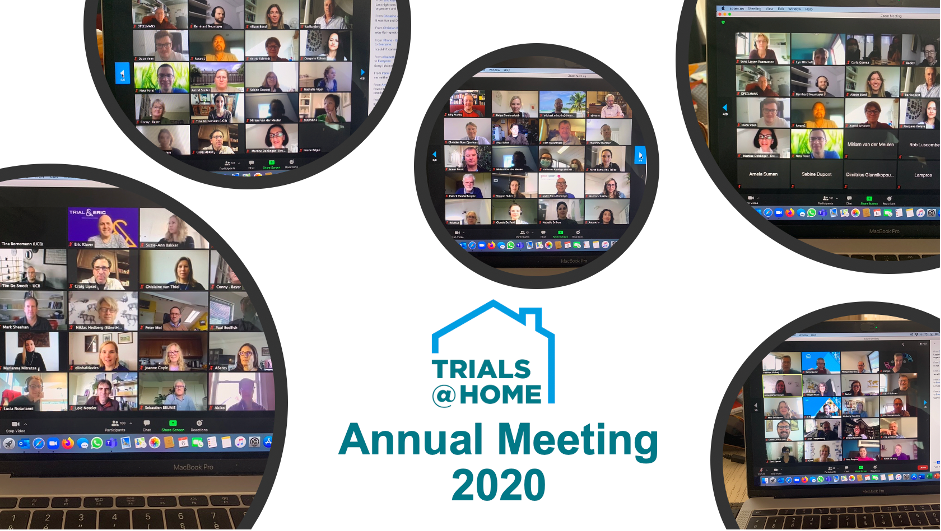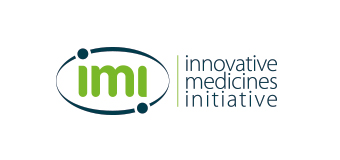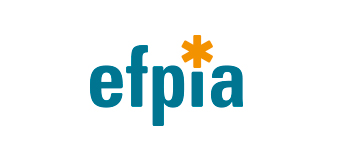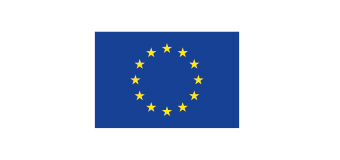Trials@Home Annual General Meeting
Public Report
5-6 October 2020
September 2019, the great and grand kick-off meeting for the Trials@Home project in Paris.
A big project, a large group of people, some have left us, some have joined us in the meantime, but what a fun two days. We all went home feeling part of the group and ready to start working on this very challenging yet exiting project.

September 2020, due to the pandemic, a fully virtual annual meeting. A two-day virtual meeting with updates, insights, learnings and even a fully virtual, yet crazy, networking cocktail!

At the start of the meeting, we were all welcomed by the project leads Mira Zuidgeest (UMCU), Kim Hawkins (Sanofi) and Rick Grobbee (UMCU/Julius Clinical).
They, again, highlighted the importance of the project and complimented all partners on work already achieved and deliverables completed.
Rick Grobbee gave us an overview – based on survey results published in Nature Reviews Drug Discovery – on the current status of clinical trials. As we all know, a lot of trials have been suspended or delayed due to the COVID-19 outbreak and most new trials that are currently ongoing are pandemic-related. The investigators that were surveyed clearly indicated that telemedicine and remote patient monitoring were the one aspect of trials they were most interested in and that would bring the most value for future trials. These insights show that the world of clinical trials is ready for Remote Decentralised Clinical Trials (RDCTs) and thus Rick, again, pointed out the importance of this IMI project and the legacy it can leave behind for the future.
All work packages (WPs) were also given the opportunity to share progress and achieved goals with the consortium. What has happened and where are we now?
WP BEST created a long list of case studies to be looked at for best practices and already published their initial list of recommendations.
WP TECH went from high-level ideas to 7 Basic Building Blocks (BBBs) with concrete visions and “shopping lists” for the technology and services needed to roll out their envisioned RDCT. An internal and external Request for Information (RFI) were published and the assessment of these results is the base for the Open Call that will be published in the second year of the project to ensure that all the BBB technology and service requirements are available for the pilot study.
WP PILOT evolved from lively and lengthy discussions to an agreed study setup and investigational medicinal products (IMP) intervention. As previously announced in the first public webinar, the chosen therapeutic area for the pilot study will be type 2 diabetes.
WP EAGLE had a big challenge ahead of them at the start of the project as they needed to set up their cross WP function, start the country mapping, and draft their advice for EMA engagement. They succeeded!
WP CODE had the biggest impact on the project as they “created” the project window to the outside world by developing the project website, a public webinar, internal webinars, and a set of surveys aimed at probing different stakeholder groups about their training needs with regard to RDCTs.
Last but not least, WP PROMS – the glue between all the other WPs – went from having but a few names on a list to establishing and onboarding the External Stakeholder Panel (ESP), a body of external experts that will advise the WPs where needed, and the Scientific Advisory Board (SAB), an independent review organ that will be consulted only on specific deliverables. They also contributed, in close collaborations with TECH and CODE, on the open call for technology and services for the pilot study.
Apart from the plenary sessions where project updates were shared, there were also various breakout sessions on both days. An overview and highlights.
In conclusion:
The 2020 IMI Trials@Home virtual annual meeting was one full of information, updates, takeaways and conclusions. We had a great meeting with a full programme of interesting topics brought to us by experts from within the project and from outside.
We have to admit, we all missed the breaks where we could chat with other project partners about the project and progress of deliverables or even concoct new ideas. Still, despite the virtual aspect of the meeting, a lot of project partners did get to meet new people, if only through the quirky networking cocktail. Viva Variety!
Upwards and onwards to hopefully being able to hold a face-to-face meeting next September with more exciting news from the project and beyond.
All the slides and recorded session are available on MPP.



This project has received funding from the Innovative Medicines Initiative 2 Joint Undertaking under grant agreement No 831458. This Joint Undertaking receives support from the European Union’s Horizon 2020 research and innovation programme and EFPIA.
Notes for editors – not for publication
If you would like more information, please contact the spokesperson at the UMC Utrecht.
Joris Prinssen: +31 6 2571 0234
press@umcutrecht.nl
